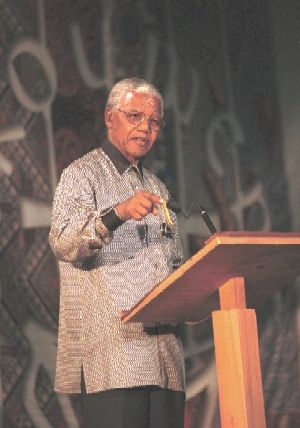By Stephen Brown
 President Nelson Mandela
today made a passionate appeal to the World Council of Churches to give the
same solidarity to the struggle for development and the entrenchment of democracy
in Africa that it gave to liberation movements fighting white rule in southern
Africa.
President Nelson Mandela
today made a passionate appeal to the World Council of Churches to give the
same solidarity to the struggle for development and the entrenchment of democracy
in Africa that it gave to liberation movements fighting white rule in southern
Africa.
Accompanied by Zimbabwean president Dr Robert Mugabe, to the music of the Imilonji KaNtu
Choral Society, a choir long associated with the African National Congress, President
Mandela received a rapturous reception from more than 3000 participants at the
celebrations.
Nelson Mandela has long had the support of the ecumenical movement and of major churches,
and today, as on previous occasions, he expressed his deep gratitude to the WCC.
The guest of honour at a ceremony today marking the 50th anniversary of the WCC's
foundation, he praised the WCC for "activating the conscience of the world for peace
and on behalf of the poor, the disadvantaged and the dispossessed".
One of the most controversial programs of the WCC's 50-year history has been its Program
to Combat Racism, launched in 1969, and the special fund from which humanitarian grants
were given to liberation movements in southern Africa. The grants were frequently
criticised because they were made directly to liberation movements engaged in armed
struggle.
"Your support exemplified in the most concrete way the contribution that religion has
made to our liberation, from the days when religious bodies took responsibility for the
education of the oppressed because it was denied to us by our rulers, to support for our
liberation struggle," President Mandela, one of southern Africa's foremost
anti-apartheid champions, told the gathering.
"To us in South and southern Africa, and indeed the entire continent, the WCC has
always been known as a champion of the oppressed and the exploited.
"On the other hand, the name of the WCC struck fear in the hearts of those who ruled
our country during the inhuman days of apartheid," said the president, who was
imprisoned from 1962 until 1990 for his struggled against apartheid.
"To mention your name was to incur the wrath of the authorities. To indicate support
for your views was to be labelled an enemy of the state."
President Mandela, who was inaugurated as South Africa's president on 10 May 1994, after
the country's first non-racial elections, told the assembly that "the eradication of
poverty and underdevelopment" was central to the challenge of the new millennium.
"My own continent of Africa dreams of an African renaissance in which, through
reconstruction and development, we will overcome the legacy of a devastating past and
ensure that peace, human rights, democracy, growth and development are a living reality
for all Africans."
President Mandela's visit to Harare for the WCC's 50th anniversary celebrations was
announced only on last Friday. Originally his deputy, Thabo Mbeki, had been scheduled to
participate.
Linking the struggle against apartheid with the struggle for development, President
Mandela told the assembly, "Thirty years ago you launched a program that broke new
ground and set new directions for the future.
"You moved beyond the affirmation of the right to resist on the part of oppressed, to
the risk of active engagement in the struggle to end oppression.
"Today the WCC is called upon to show that same engagement in the new and more
difficult struggle for development and the entrenchment of democracy."
Back to top



President Nelson Mandela today made a passionate appeal to the World Council of Churches to give the same solidarity to the struggle for development and the entrenchment of democracy in Africa that it gave to liberation movements fighting white rule in southern Africa.
